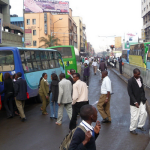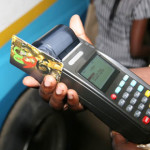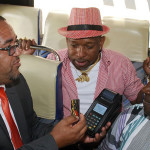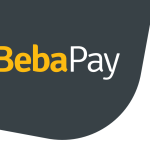Imagine you have arrived at Dagoretti corner matatu stage when suddenly, swoosh!, a thug swipes your phone out of your hand! Luckily, he didn’t get your wallet and you still have some cash so you board the next matatu bound for the nearest police station to report the theft. “Here’s my 20 bob,” you try to hand the conductor your coin but he shakes his head vigorously. “Hapana, hatuchukui cash, bebapay tu (no, we don’t take cash, only a bebapay card).” You don’t have a bebapay card, but you do have a new Visa card. So you hand that to the conductor who shakes his head again. “Hapana, sisi hatuna machine ya Visa. Bebapay tu! (We don’t have a machine for Visa, you can only use bebapay.)”
Have you heard of the National Transport & Safety Authority Act Legal Notice 23 of 2014? It created regulations due to be implemented by all public service vehicles (PSVs) including matatus, buses, and taxis. The regulations instruct operators of PSVs that they must operate a cashless fare system as from the 1st of July 2014. The Regulations were subsequently revoked and replaced by those created by Legal Notice 23 of 2014 but these still contain the rule on operating cashless payment systems. Essentially, this means that it shall be illegal to operate PSVs after that date without a cashless system. Operators or drivers of PSVs in default risk being subjected to a fine of Kshs. 50,000, imprisonment for one year, or both. In addition, the Authority has wide powers to cancel operator and drivers licences for violations of this and other regulations passed by that legal notice.
We are curious about the current cashless systems available to PSVs and their viability if the regulations are to be implemented as they are. As iHub, we see the proposed cashless system as presenting great potential opportunities, especially around increased transparency in the transport sector. But we also see potential risks at hurriedly implementing a system without studying the broader impacts of such swift changes to the transport sector. Therefore, we hope to facilitate a growing dialogue around the latest legal notice to affect Kenyan technology users.
So we have this legal notice. What options for cashless payments exist anyway?
Current cashless payment options include the following:
mPesa (Safaricom)
Most commonly implemented via the M-Pesa Safaricom service in phones, the transaction is sent to Paybill with the business number and amount to be credited to the respective recipient’s account. Matatu owners pay Safaricom 1% commission on total transactions paid through m-pesa. The product works offline, and transactions can be accessed anytime electronically. Disadvantages include that Safaricom’s control of SIM cards locks out other mobile service users (e.g. what do you do if you only have an Airtel line?); there is a minimal transaction fee incurred, and payment charges may be high for small transactions. (Source)
bebapay (Equity Bank + Google)
Bebapay is a free top-up card gotten from Equity Banks, BebaPay agents and Tellers. Topping up and making payments are free services, unless using mobile money providers. However, an initial deposit of Ksh.250 is required to use the card, and the card/account can hold up to Ksh.10,000 credit. The product works offline – tap and go, and balance check, notifications of top-up or usage received by SMS. Transactions/real time sales can be monitored/tracked electronically by SMS or online by matatu owners, and this aids in decision-making, e.g. on which route to invest buses.
BebaPay service is integrated in phones (NFC-enabled), independent of telecoms; however, unavailability or loss of phone would mean no BebaPay transaction. To curb that, NTSA is looking at having a fixed POS (points-of-sale) in buses where passengers can tap. Also, loss of card would mean contacting Equity and its agents to block your account, which takes up to 24 hrs to register in the system. (Source 1; Source 2; Source 3).
With Visa, one taps their Visa card on a mobile phone or gadget to make payment, instead of swiping the plastic card. This requires a shift from magnetic card strips to chip-based versions for high security to curb fraud. May incur transaction charges. (Source).
Pesapal
A registered PesaPal businessman/matatu owner first creates an entry point for payments, i.e. website with integrated PesaPal, an invoice issued from the owner’s PesaPal account, or listing on PesaPal’s bill payments. A buyer pays using mobile money, credit card or PesaPal wallet. For offline transactions, a unique PesaPal reference is required. Payment is received in a trust account which is transferred to the recipient’s account upon a withdrawal request. Receipt of transaction notifications and summary, and payment status via SMS or online. This option is more online-focused, think e-commerce. (Source).
mobikash
Money is loaded into Mobikash account at an agent outlet, or linked bank account from the mobile phone, and sent from Mobikash mobile account by selecting source and destination account and sending to the selected number. Similar to m-pesa, however, in this case, money can be sent to and from any mobile phone subscriber and linked bank accounts. Bills can be paid directly from Mobikash or any of the linked bank accounts, without the intervention of an agent. Mostly mobile phone accessed, even bank accounts, and transactions can be managed on the phone. (Source).
MY1963Card
MY 1963 card has been rolled out recently by the Matatu Owners Association in conjunction with the Matatu Welfare Association. The MY 1963 pre-paid card is developed and operated by Fabre space Limited on a point of sale [POS] terminal installed in My 1963 compliant buses and matatus.
AbiriaCard (KCB + Mastercard + KBS)
Abiria card has been rolled out by Kenya Commercial Bank, MasterCard and Kenya Bus Services. The card uses near field technology (NFC), where commuters pay fare by tapping onto a receiver gadget owned by the bus company. Commuters have to pre-load their fare in order to pay for public passenger transport (buses, taxis, ferries, trains, road toll and parking). To acquire an Abiria card, you must go to sales or reloading stations and present your identification to register and receive a card. You must pay a refundable deposit of Kshs. 50. According to the Abiria card website, sales/reloading stations are currently at:
- Kencom Bus stop
- Ambassador Hotel bus stop
- General Post Office (GPO)
- Community
- Kenyatta National Hospital
- Central Bus Station
- Kibera
- Utawalla
- Kawangware
Abiria Card is powered by TapToPay Ltd (a subsidiary of Advanced Card Systems (ACS) based in Hong Kong). Pilot Routes that currently support Abiria Card are:
- City Centre – Community – Ngong Road – Kibera and Back
- City Centre – Community – Kenyatta National Hospital and Back
- City Centre – Mombasa Road – Utawalla and Back
- City Centre – Yaya – Kawangware and Back
Cashless vs Cash
Proponents believe that cashless is a more organized structure of payment. Generally, fare is standard, does not fluctuate upon seasons and peak hours, e.g. rains or traffic. Since no loose cash is involved, there is no risk of unpaid loose changeeither. Since most cashless forms are electronically friendly, transactions can be monitored. For matatu owners, this enables tracking of sales and aids in decision-making. Also, when it comes to taxes, matatu owners have had to pay taxes beforehand to the Government, but with Cashless, revenue earned is represented through statements/bank accounts, and they can remit taxes to KRA accordingly.
On the other hand, matatu operators – drivers and conductors, are reluctant to accept cashless on the grounds that they will not have loose cash on hand for emergencies such as immediate vehicle repairs, refunding transferring passengers to other matatus, cartels on some routes who need their cuts, bribing police, etc. Also, using a cashless system denies them the extra cash at the end of the day, a share of the day’s proceeds. Overall, passengers may have to pay/end up paying more due to transaction charges incurred in some cashless forms. There will also be costs involved in setting up the initial tech infrastructure and such costs may end up being passed down to the public transport users.
There are several pending questions which we are still hoping to answer in the coming days with input from various stakeholders such as NTSA and private implementing companies. For example, once public transport vehicles all move to cashless systems, do the matatu associations choose which system they will use or do all of them choose the same one?Will the cashless systems be nationwide or only in Nairobi?
All of the options stated above still have areas of further improvement with none of the options yet proving to be a clear front-runner in cashless public service vehicle payments. Issues that should be discussed especially center on accessibility and inclusivity for all public transport users, data protection and security, and technology infrastructure.
What do you think are additional possible pitfalls and potential opportunities of a cashless PSV payment system? We look forward to reading your thoughts in the comments section below.
Update:
1) This post was edited to clarify that Legal Notice No, 219 of 2013 was revoked by Legal Notice 23 of 2014.
2) Abiria card was added to the list of possible options.
By: Angela Okune, Tabish Bachani, & Wambui Wairua





![Transit Cards to Replace Cash on Kenyan Minibuses Are a Hard Sell [NY Times]](../../../blog/wp-content/uploads/2014/07/beba-150x150.jpg)






